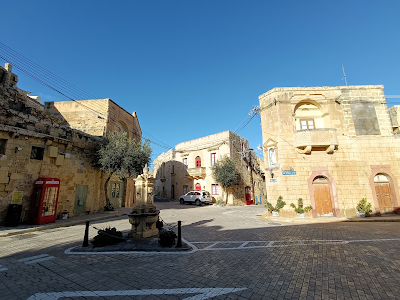A True Developed Country Has Equally Good Public Services in the Biggest Cities and the Most Remote Villages
In the remote western corner of Gozo, the three-street village of Gharb (population: 1,549) is, like every town and village in the country, centered on a gigantic church. But right around the corner from the church is a primary health clinic, in the familiar light green and red livery that also coats its siblings dotted around the island. Next to the clinic is an elementary school and nursery complex, flanked by a soccer field and playground, the grass and equipment looking well-maintained despite their clear age.
Socioeconomics often says that the true difference between a developed and a developing country lies not in the richest cities but in the smallest, most hard-to-reach villages. This truism is more apparent than here in Malta, where the smallest communities of a dozen households will contain government-funded health centers, schools, and community libraries for local residents. Given that many doctors, teachers, and librarians would prefer working in a bigger town (or even another country altogether), undoubtedly the government is paying a steep price for this network's upkeep.
For those billions of euros in taxpayer money down the drain, Malta is getting a remarkably geographically equitable sense of livability. Yes, the country may only have one comprehensive public hospital in Malta and another in Gozo, but the villages I walked through, far from these facilities, hardly felt deprived. The primary health clinics, located in one of the ubiquitous stone buildings, look bright and modern on the inside upon a quick glance. Together with pharmacies nearby, they ensure locals do not have to undertake a long drive for basic treatments.
These public facilities partially help answer my nagging question about why modernization has not led to more urbanization concentrated in the biggest cities. This is not just in Malta. Even in the US, where massive land areas ensure plenty of nearly empty spaces between vibrant cities, plenty of people are staying put in what can only be called villages, and even looking for housing in the middle of nowhere to get away from the noise and crowds of the cities.
I never understood the sentiment in the past. Cities are the epitome of human development, with the greatest concentration of resources, be they educational, medical, economic, or cultural. As cities abandon their reputation for air pollution and traffic thanks to a shift to a service-centered economy and more sensible urban planning, there may be a smaller set of reasons not to move to the city. The benefits are too great even for those who aspire to be alone in a forest.
But a walk in rural Gozo shows that, with the set of government-funded infrastructure, a village can truly be a small city. The big city will host more museums, art exhibitions, and cinemas simply because of a larger potential clientele. Yet, today, the gap is made much smaller with internet access, courtesy of government investment in broadband. Whatever needs physical access can easily be reached by car, as the narrow but smoothly paved roads radiating from the capital city of Victoria help the island's residents easily cross from one end to the other in less than an hour even with traffic.
Thanks to these public goods, I, someone who has always enjoyed the convenient public transport and density of stores in big cities, can foresee myself living in these tiny rural "cities." On top of the benefits of being close to nature, having cheaper rent, and a more relaxed lifestyle, I may not even be missing out much on what makes city living so wonderful: the availability of so many different services that make it possible to get help 24/7. If I can get the equivalent without incurring all the financial and mental costs of city living, then the allure of the big city quickly fades.
Perhaps the truism that a developed country shows up in the villages has a corollary: it is that successful urbanites in developed countries want to move to rural areas, not because of a career change but simply to enjoy good amenities in peace and quiet. In a poor country where all the top-notch services are concentrated in the largest cities, such a "back to the village" movement would not be possible except for the very rich, with their personal doctors, drivers, and security guards. But a walk to Gozo shows that in true development, it is the urbanites that envy the lives of the villagers.



Comments
Post a Comment